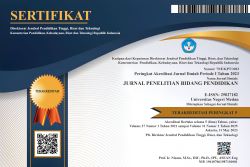PENINGKATAN PENGETAHUAN KONSEPTUAL TINGGI PADA MATA KULIAH FISIKA UMUM I DALAM PEMBELAJARAN BERBASIS MASALAH
DOI:
https://doi.org/10.24114/jpbp.v21i2.3367Keywords:
Pembelajaran Berbasis Masalah, Berpikir Tingkat Tinggi, Pengetahuan Konseptual.Abstract
Abstrak Penelitian Tindakan Kelas ini bertujuan untuk mendeskripsikanpenerapan model pembelajaran berbasis masalah dan peningkatan ketrampilanberpikir tingkat tinggi pengetahuan konseptual mahasiswa tingkat pertama.Yang menjadi subyek penelitian adalah mahasiswa Jurusan Biologi ProgramEsktensi semester I Tahun 2014 FMIPA Universitas Negeri Medan. Penelitianini dilaksanakan dalam dua siklus yang meliputi perencanaan, pelaksanaan,observasi, dan refleksi. Hasil penelitian ini menunjukkan bahwa penerapanmodel pembelajaran berbasis masalah meningkatkan ketrampilan berpikirtingkat tinggi pengetahuan konseptual. Ini terlihat dari perolehan skor pretesdan postes yang meningkat dari siklus I ke siklus II. Berdasarkan pengolahandata siklus I, dapat disimpulkan ada dampak pembelajaran pada ketrampilanberpikir tingkat tinggi pada pengetahuan konseptual, namun masih dalamkategori rendah. Pada siklus II terjadi peningkatan ketrampilan berpikir tingkattinggi pada pengetahuan konseptual setelah sesi pembelajaran, namun demikianpeningkatan yang teramati itu masih dalam kategori rendah.References
Alibali, M (2006) Does visual scaffolding facilitate
students™ mathematics learning?
Evidence from early algebra.
http://ies.ed.gov/funding/grantsearch
Anderson, L. W. & Krathwohl, D. R. (Eds.)
(2001). A taxonomy for learning,
teaching, and assessing:A revision of
Bloom™s taxonomy of educational
bjectives. New York: Longman.
Anonim, (2013) Rasional Kurikulum. Badan
Pengembangan Sumber Daya
Manusia Pendidikan dan Kebudayaan dan Penjaminan Mutu
Pendidikan, Kementrian Pendidikan
dan Kebudayaan
Arends, RI (2012) Learning to Teach. New York:
McGraw-Hill
Bloom, B. S., Engelhart, M. D., Furst, E. J., Hill,
W. H., & Krathwohl, D. R. (1956).
Taxonomy of educational objectives:
Handbook I: Cognitive domain. New
York: David McKay.
Cobb, P. (1994) Constructivism and Learning. In
Husen, T. & Postlethwaite, T. N. (Eds.),
International Encyclopedia of
Education, Oxford: Pergamon Press
Ding, L.; et al (2011) Exploring the Role of
Conceptual Scaffolding in Solving
Synthesis Problems. Physical Review
Special Topics-Physics Education
Research 7, 020109
http://prst-per.aps.org/
Honebein, P. (1996) Seven Goals for Design
Constructivist Learning Environments.
New Jersey: Educational Technology
Publications
Lee, KW., et al (1996) Cognitive Variable in
Problem Solving in Chemistry, A
Revisited Study, Science Education,
New York: John Wiley & Sons
Munaf, S. (2001). Evaluasi Pendidikan Fisika.
Bandung: FPMIPA UPI
OECD (2013), PISA 2012 Assessment and
Analytical Framework: Mathematics,
Reading, Science, Problem Solving and
Financial Literacy. OECD Publishing.
http://dx.doi.org/10.1787/978926419051
-en
Kiley, M; et all (2005) Problem-based Learning,
The University of Adelaide Pranata,
R., et all (2013) Pengaruh
Implementasi Model Rekonstruksi
Sosial Vigotsky dengan Teknik
Scaffolding terhadap Sikap Sosial dan
Prestasi Belajar IPS, e-Journal
Program Pascasarjana Universitas
Pendidikan Ganesha Program Studi
Pendidikan Dasar (Vol.3 Tahun 2013)
Nguyen, DD (2009) A Study of the
Implementation of a Problem-Based
Learning Approach in University Classes in Vietnam: A thesis submitted in the
total fulfilment of the requirements
for the degree of Doctor of
Philosophy. School of Education
College of Design and Social Context
RMIT University
Santyasa, IW (2008) Pembelajaran Berbasis
Masalah dan Pembelajaran Koperatif,
Disajikan dalam Pelatihan tentang
Pembelajaran dan Asesmen Inovatif
bagi Guru-Guru Sekolah Menengah
di Kecamatan Nusa Penida, tanggal
, 23, dan 24 Agustus 2008 di Nusa
Penida.
Savinainen, A. & Scott, P. 2002. The Force
Concept Inventory: a tool for
monitoring student learning. Physics
Education, 37(1)
Strobel, J., Barneveld, A. (2009) When is PBL
More Effective? A Metasynthesis of
Meta-analyses Comparing PBL to
Conventional Classrooms,
Interdisciplinary Journal of Problembased
Learning Volume 3 Issue 1,
Published in Open Access Format
Supported by Teaching Academy at
Purdue University, the School of
Education at Indiana University, and
the Instructional Design and
Technology program at the
University of Memphis.
http://docs.lib.purdue.edu/cgi/viewco
ntent.cgi?article=1046&context=ijpb
Suparno, P (2005) Miskonsepsi dan Perubahan
Konsep dalam Fisika. Jakarta: Grasindo
Tan, OS (2003) Problem-Based Learning
Innovation, Using Problems to Power
Learning in the 21st Century.
Singapore: Cengage Learning
Vygotsky, LS (1978) Mind in society: the
development of higher psychological
processes. London: Harvard
University Press
Wardana, N. 2012. Pengaruh Penerapan
Model Pembelajaran Berbasis
Masalah dan Ketahanmalangan
Siswa terhadap Kemampuan Berpikir
Tingkat Tinggi dan Pemahaman
Konsep Fisika, Jurnal Penelitian
Pascasarjana Undiksha Vol 2 no. 1
http://pasca.undiksha.ac.id/ejournal/index.php/jurnal_ipa/article/
Downloads
Published
Issue
Section
License
Authors who publish with this journal agree to the following terms:
a. Authors retain copyright and grant the journal right of first publication with the work simultaneously licensed under a Creative Commons Attribution License (https://creativecommons.org/licenses/by/4.0) that allows others to share the work with an acknowledgement of the work's authorship and initial publication in this journal.
b. Authors are able to enter into separate, additional contractual arrangements for the non-exclusive distribution of the journal's published version of the work (e.g., post it to an institutional repository or publish it in a book), with an acknowledgement of its initial publication in this journal.
c. Authors are permitted and encouraged to post their work online (e.g., in institutional repositories or on their website) prior to and during the submission process, as it can lead to productive exchanges, as well as earlier and greater citation of published work (See The Effect of Open Access).

